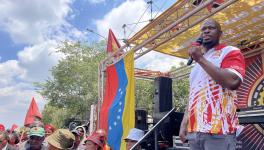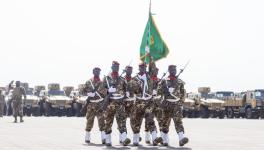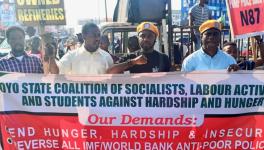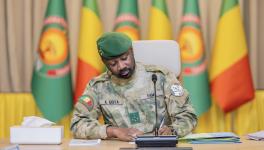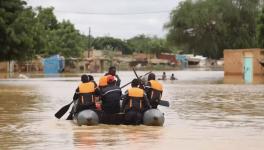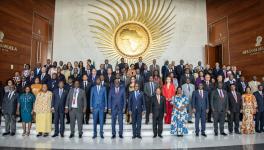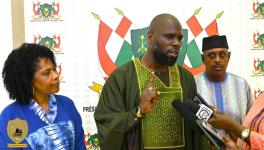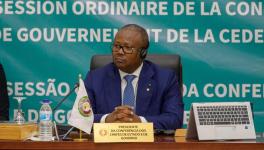ECOWAS to hold talks with Niger as Sahel states moves to expand ties
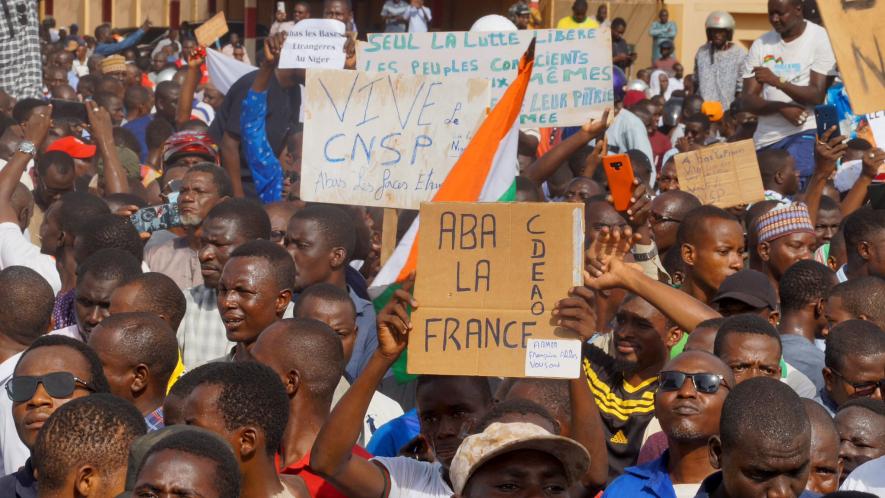
Protesters in Niger hold signs in support of the CNSP and against France.
The Economic Community of West African States (ECOWAS) has agreed to establish a commission to hold talks with Niger, nearly five months after the country’s military leaders ousted president Mohamed Bazoum and seized power in a coup which received popular support.
“The heads of state have recognized that what happened in Niger is a coup and the CNSP (National Council for the Safeguard of the Homeland) is a military administration in Niger,” the bloc’s president, Omar Alieu Touray, told reporters— marking an official recognition of Niger’s present government.
The statement was issued following the 64th Ordinary Session of the Authority of ECOWAS Heads of State and Government in the Nigerian capital of Abuja on December 10.
The proposed commission will be composed of Togolese president Faure Gnassingbé, and his counterparts from Sierra Leone and Benin, as well as representatives from Nigeria, which is the current chair of ECOWAS, “with a view to agreeing on a short transition roadmap, establishing transition organs…(and) the setting up of a transition monitoring and evaluation mechanism.”
On December 8, General Abdourahamane Tiani, the head of the CNSP, visited Togo to meet with president Gnassingbé to “deepen bilateral cooperation in the areas of common interest.” Among the key outcomes of the meeting was the decision to open a Togolese embassy in Niamey as well as discussions around the “Lomé-Ouagadougou-Niamey” transit and transport corridor once the situation had “normalized.”
The CNSP has designated Togo to lead the facilitation between Niger and the international community, including ECOWAS, which imposed sweeping sanctions and border closures on the land-locked country following the coup on July 26.
The summit in Abuja determined that based on the outcome of the negotiations with the CNSP, ECOWAS will “progressively ease” the sanctions imposed on Niger. Meanwhile, failure of the CNSP to “comply with the outcomes of the engagements,” ECOWAS will “maintain all sanctions,” including the use of force, and call on the African Union and other partners to impose targeted sanctions on Niger.
Sunday’s declaration was informed by the recommendations made by ECOWAS’ Mediation and Security Council (MSC), which met in Abuja on December 6. The MSC called upon the Heads of State to impose upon Niger “a short transition period leading to the restoration of constitutional order,” adding that the “CNSP should indicate its acceptance of the transition period within two weeks of this decision.”
The bloc has also called upon Niger to release Bazoum with immediate effect. The CNSP had detained the ousted president following the coup in July, and declared that it intended to prosecute him for the crimes of high treason and undermining the internal and external security of Niger.
The MSC also noted the “aggravated” humanitarian conditions in Niger as a result of the sanctions imposed, including the sharp rise in the prices of food and other basic necessities amid cash shortages.
Urgent need for removal of sanctions
On December 7, the ECOWAS Court of Justice dismissed a request filed by Niger for the Court to suspend the sanctions imposed by the regional bloc. The petition was part of a broader case brought by Niger and seven other countries against the legality of sanctions imposed by ECOWAS.
As part of its application, Niger had drawn attention to the impact of sanctions on the population, including shortages of food, medicine, and electricity. The country was plunged into power blackouts after Nigeria, which accounted for 70% of Niger’s electricity supply, stopped energy provisions in line with the sanctions.
Thousands of people gathered in the capital of Namey on Saturday in renewed protests calling for an end to these harsh economic measures.
“We called on the people to stand up the day before the meeting of the heads of state of ECOWAS in order to tell them that since July 26, our people have decided to no longer bow their heads…we have decided to assume our independence and our sovereignty, and this involves the demand we are making today for the immediate and unconditional lifting of these sanctions,” stated Bana Ibrahim, a member of the Patriotic Front for Sovereignty (FPS), a collective of civil society organizations in Niger.
On December 11, a group of international NGOs raised an urgent call for ECOWAS to ease sanctions, warning that over 4.3 million people were in urgent need of aid. The bloc has not provided any humanitarian exemptions in the sanctions it has imposed on Niger, taking a much harsher approach than when it had enforced sanctions in response to a similar coup in Mali, where it allowed for the provisioning of pharmaceuticals, oil, and food imports, and electricity.
“Over 2 million people were food insecure between October and December 2023, which has forced 15% of the population to move due to lack of access to food or assistance,” said Mohammed Chikhaoui, the humanitarian representative of INGOs in Niger.
“Children suffer the worst; the 185,000 children under five suffering from moderate acute malnutrition no longer have access to treatment as it is no longer available, of whom 40,000 children are at risk of falling into the most severe and deadliest form of malnutrition.”
The INGOs added that the border between Benin and Niger had remained closed, and that the alternative routes via air or through Burkina Faso were too slow, expensive, and less effective. These organizations had previously also stated that even the permitted passages for humanitarian supplies were “inconsistent,
” with “cargo sitting at the border with much delay, compromising the contents, especially as related to nutrition and medical commodities”.
Despite the extreme measures imposed by ECOWAS, both Mali and Burkina Faso have continued to provide material assistance to Niger, including food supplies. Touray had also noted in his comments the “high volume of transit goods through Burkina Faso” to reach Niger.
Importantly, the ECOWAS MSC meeting had also pointed to the impact of these measures on local economies in the border areas of neighboring countries, and potential delays in an oil pipeline project.
In November, Niger commissioned the construction of the nearly 2,000 kilometer pipeline that would carry crude oil from Agadem, in the desert region of Diffa, to the port of Cotonou in Benin. The border between Niger and Benin had been closed as ECOWAS sanctions came into effect in July.
Nigerien prime minister, Ali Mahaman Lamine Zeine, had stated that the “The resources resulting from exploitation … will be intended exclusively to ensure the sovereignty and development of our country on the basis of equitable sharing among the populations”. The oil is extracted by PetroChina, a subsidiary of the state-owned China National Petroleum Corporation.
According to the West African Oil Pipeline Company (WAPCO— a joint venture between companies from Nigeria, Benin, Togo, and Ghana of which Chevron is a majority shareholder), approximately USD 6 billion has been invested in the project. This has boosted Niger’s oil production to 110,000 barrels per day, out of which 90,000 are to be exported.
Niger is projected to produce 200,000 barrels of oil per day by 2026, with official estimates placing its reserves at around two billion barrels.
ECOWAS’ financial control and alternatives for cooperation
Not only did ECOWAS close down borders with Niger, the bloc, along with the West African Economic and Monetary Union (WAEMU) also imposed sweeping economic and financial sanctions on the country.
These included the suspension of all commercial transactions including trade in goods and services, the freezing of Niger’s state assets in the Central Bank of West African States (BCEAO) as well as freezing the assets of the state and state enterprises in commercial banks. All financial assistance provided by regional development banks was also suspended.
The neocolonial extraction of Niger’s mineral wealth, being the seventh-largest producer of uranium in the world, also manufactured aid dependency in the country, with approximately 40% of the state budget being financed by external partners through loans and grants.
Not only was development aid suspended, the ECOWAS sanctions also restricted Niger’s access to the WAEMU regional debt markets for it to be able to finance its budget and importantly, to conduct banking transactions including debt service payments. By November, Niger had defaulted on interest and capital payments amounting to USD 304 million.
International organizations have also mentioned the lack of legal clarity among banks, insurers, suppliers and other private entities of the extent of the sanctions, pointing to a persistent issue of overcompliance, which in other contexts has been a cause of critical delays in life-saving aid.
While ECOWAS sanctions have worked to isolate Niger, in September, Niamey joined Burkina Faso and Mali to form the Alliance of Sahel States (AES), a pact for the establishment of “collective defense and mutual assistance.” The significant move came in the wake of intensifying attacks by armed groups that have destabilized the Sahel region for over a decade, one of the outcomes of NATO’s disastrous intervention in Libya in 2011.
While the AES emphasized that security cooperation was one of its core aims, General Tiani stated during a recent interview that the alliance “must evolve in the political domain and in the monetary domain.” Over the weekend, Burkina Faso’s president, Ibrahim Traore, had also stated that the AES is a “defense alliance a priori, but which will evolve toward an economic alliance and much more”.
In November, finance ministers from the three countries held a meeting to discuss themes including food and energy security, industrial transformation, and financing and economic integration. This involved deliberations on critical issues including an economic and monetary union, the establishment of a stabilization fund to be able to cope with shocks, as well as the creation of an investment bank.
Just a few days later, another tripartite meeting was held, this time with the countries’ foreign ministers, to discuss steps to operationalize the AES. Among its key recommendations was the creation of a confederation between Burkina Faso, Mali, and Niger.
There is historical precedent for such a formation on the African continent, particularly during the period of decolonization, including when Pan-Africanist revolutionary leaders Kwame Nkrumah, Ahmed Sékou Touré and Modibo Keïta came together to form the Ghana-Guinea-Mali Union or the Union of African States. The Democratic Republic of Congo (DRC) was also set to join the union, just before the assassination of its first president, Patrice Lumumba, in a US-backed coup.
The development of a monetary and economic union among the AES countries is of great significance in the context of the enduring control that is exerted upon them in the form of the CFA Franc, a common currency that is a colonial relic still in use in 14 African countries.
Burkina Faso, Mali, and now Niger have taken decisive steps to break away from the influence that France, the former colonizer, continued to exercise upon them after independence.
A major manifestation of this was the scrapping of military agreements with France and the expulsion of its troops from their soil, nearly a decade after France intervened militarily in the region under the guise of fighting armed insurgents (some 1,100 US troops remain in Niger where it also operates two bases, including the drone base in Agadez). On December 1, Burkina Faso and Niger formally withdrew from the G5 Sahel and the France-backed G5 Sahel Joint Force. Mali had left the military alliance in 2022.
These countries have since also undertaken initiatives to gain more control over natural resources and minerals. On December 5, Mali and Niger followed in the footsteps of Burkina Faso to denounce tax agreements signed with France, citing Paris’ “persistent hostile attitude” towards the two countries, as well as the “unbalanced” nature of the agreements themselves.
What Burkina Faso, Mali, and Niger are attempting to do also speaks to the need to address issues of not only political sovereignty, but economic and monetary sovereignty — at the core of which is the CFA Franc.
While France has recently announced certain “reforms” to the currency, including the removal of a French representative in the decision-making bodies of the BCEAO and the enforced requirement for member countries to deposit 50% of their foreign reserves with the French treasury, the core of this system which perpetuates the subjugation of African countries will remain in place — including the fact that the “reformed” CFA franc will remain pegged to the Euro.
Moreover, given that the BCEAO issues the CFA Franc to member countries and is also where these governments store their assets and maintain their accounts, this was instrumentalized to impose sanctions on Niger and Mali before that, including the restrictions on international transactions and financing.
ECOWAS’ response to the coup in Niger, particularly the authorization of the use of force against a member state, was met with opposition by countries not only within the bloc but also the continent, posing a crisis of legitimacy even as France moved to back the intervention. The bloc has now warned against a “phantom attempt to divert attention from our mutual quest for democracy and good governance,” referring to the AES.
Concerns of instability and a “coup contagion” in West Africa, which, in part, explained the harsh international response to the coup in Niger, are wholly dismissive of the growing public anger in the region against imperialist exploitation, particularly by France. These coups are presented as aberrations, while formal processes of elections have been presented as proof of “peace and stability” and “good governance”, the benefits of which do not seem to reach the masses.
Get the latest reports & analysis with people's perspective on Protests, movements & deep analytical videos, discussions of the current affairs in your Telegram app. Subscribe to NewsClick's Telegram channel & get Real-Time updates on stories, as they get published on our website.









